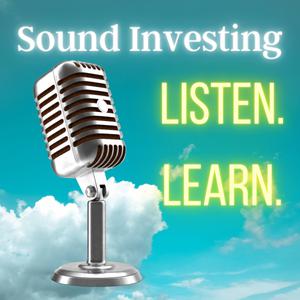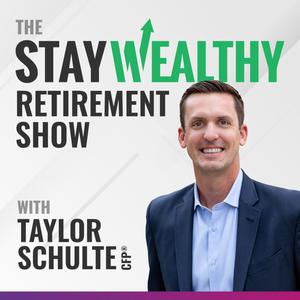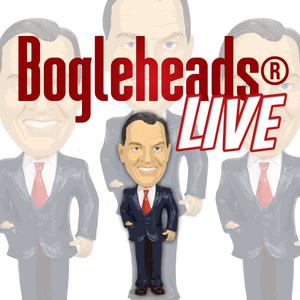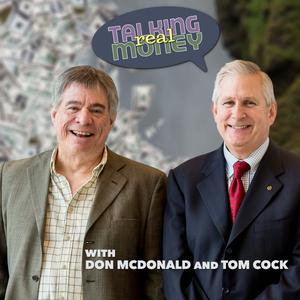
Sound Investing
Paul Merriman
Weekly podcasts with Paul Merriman. Strategic planning for investing at every stage of life.
- 56 minutes 23 secondsWhy should small cap value make higher returns?
In this first Q&A podcast of 2025, Paul, Daryl, and Chris discuss several listener questions and expand on Paul's rebuttal of Big ERN's recent criticisms of diversifying with small-cap value.
0:00 – Introduction
0:29 – Responding to Big ERN's critique
2:11 – Small-cap value lumpsum vs. dollar-cost averaging
6:38 – Daryl's take on SCV's premium persistence
8:46 – Chris' take on SCV's premium persistence
15:50 – Paul highlights the random timing of SCV vs. S&P500 returns
19:50 -- Are there good alternatives to Vanguard's Wellesley fund?
26:18 -- Does 2 Funds for Life mean no SCV in retirement?
29:35 -- Why not let Buffet manage our money in BRK.B?
33:52 -- What portfolio to get a 3.6% safe withdrawal rate in retirement?
38:53 -- Which accounts do we tap for our annual spending needs?
49:39 -- Why doesn't the Portfolio Configurator include REITs and emerging markets?
54:52 -- When will the Best-in-Class ETF recommendations be updated?
These tables were referenced-
Table G-1b - Fine Tuning Table: S&P 500 vs US SCV Equity Portfolio - Out-Performance
15 January 2025, 4:07 pm - 45 minutes 1 secondThe True Story About Small Cap Value
There has been a lot of anti small cap value articles and podcasts over the last several years. I have been asked many times whether I think the small cap value premium is a thing of the past.In this podcast I have addressed the most commonly discussed criticisms of small cap value. During the presentation I reference a blog entitled, "Small-Cap Value Stocks: Diversification or Di-WORSE-fication?"
The Early Retirement Now newsletter is written by Karsten Jeske, PhD, CFA. Here is a video of a friendly debate that Karsten and I had on the “Forget About Money” podcast. Listeners will learn that Karsten and I have very different beliefs about what returns best represent the small cap value premium. I reference the real time Morningstar performance results of DFFVX (2000 to present), DFSVX (1993 to present) and AVUV (2019 to present).
During my discussion I reference Table G-1b, Fine Tuning Table: S&P 500 vs. US SCV Equity Porfolio - Out-Performance and Table H2a - Sound Investing Portfolios: Comparison Data
I also referenced a Q&A response on Truth Teller Rob Berger regarding his personal take on small cap value in his own portfolio.
I also mention the interview with Jim Dahle at the 2024 Bogleheads Conference. https://www.youtube.com/watch?v=8C3KhRJCwCQ
8 January 2025, 2:23 pm - 50 minutes 3 secondsPaul Merriman speaks with Robert Pass on Pediheart: Pediatric Cardiology Today Podcast - "When it comes to retirement, how much is enough?"
The following are Dr. Pass’ note to his podcast: "This week to conclude 2024 we speak with noted investment expert Mr. Paul Merriman to discuss a few topics related to personal finance and investing. First we tackle the notion of having 'enough' to retire. Is there a magic value and how would one think about this? Why is an S&P 500 Index or Total US Stock Market Index a fine 'core' investment and how might one possibly improve upon its performance? What are some of the psychological hurdles we have as investors and potential retirees? Mr. Merriman reviews these and other topics on our end of year episode.”
Last Year's episode of Pediheart was replayed on Mr. Merriman's site
1 January 2025, 2:39 pm - 18 minutes 13 secondsCould this be the #1 Reason to Invest in Index Funds? Part 2
On December 26, 2019 Paul recorded a podcast entitled, “Could This Be the #1 Reason to Invest in Index Funds?” We were shocked to learn that over 1,000,000 investors opened the podcast. In this podcast he addresses the topic again in “Could This Be the #1 Reason to Invest in Index Funds? Part 2”
The podcast reviews the well established index advantages and adds one that may be the biggest reason an investor is able to find comfort staying the course in an index fund for the rest of their life. This might be a good podcast to share with your young adult children.
25 December 2024, 3:07 pm - 1 hour 1 minuteRisk with Paul, Daryl and Chris
Paul, Daryl, and Chris discuss the risks of investing and life.
Paul starts with an introduction and admission of his challenges managing risks related to diet and health. He then gets Chris and Daryl to chime in with their definitions and perspectives on risk.
Daryl then shares a framework for evaluating risk from his days as a systems engineer. The framework looks at risks in two dimensions: likelihood and impact (or severity). He describes how the framework can help prioritize which risks to mitigate and gives examples of how some financial risks might be reduced in both dimensions. Chris is reminded of the book "Die with Zero," and mentions how risks extend beyond finances to experiences.
Paul, Chris, and Daryl then discuss some of their challenges in managing the risks of their own portfolio allocations and how their behaviors differ from what might be considered ideal. This leads to discussing the dangers of learning the wrong lessons with examples from inside and outside the personal finance world.
Paul reads from the Jonathan Clements article that inspired this podcast: "The Risks We Miss."
Paul then closes out the podcast.
Outtakes include Paul and Chris discussing how the Best-in-Class ETFs can help mitigate risk, and what Daryl wants for Christmas.
Watch video here- https://youtu.be/veXXh-YVYKU
18 December 2024, 4:47 pm - 50 minutes 58 secondsQuestions from Paula Pant
While I was at the Bogleheads conference in Minneapolis earlier this year, I had a lengthy interview with Paula Pant.
I enjoyed the interview and found lots of questions and comments under the YouTube presentation that I wanted to answer.
While I wrote short comments on the site, I decided many of the questions were worthy of more discussion.Here is a link to the YouTube interview and podcast:
#1. “Most of my holdings are in cash as I cashed out last time the market went down. How do I stay invested and think long-term to help me ride out the ups and downs of the market?” 02:17
#2. “I’m just beginning my investment journey and planning to put 85K into dividend stocks so that I will be making up to 30% per year in dividend returns.” https://rethinking65.com/the-preference-for-dividend-paying-stocks-is-irrational/ 10:41
#3. "What Fidelity Funds do you recommend to build your 4 Fund Portfolio?" 15:00
#4. "How often do you recommend rebalancing the 4 Fund Portfolio?" 17:02
#5 "Nobody knows what’s going to happen next so we should practice some humility and CHOOSE a strategy with a long-term edge." What is the edge and what else do you need to know dividend stocks k? 21:02
#6. "I”m not looking to beat the S&P 500…I’m more than happy with the returns I get from it.” Does that mean it’s right for you? 24:36
#7. In response to Paul's recommendation of the 4 Fund Portfolio this is what one viewer said, “For what it's worth, backtesting shows his proposed fund portfolio does not do better than VTI or VOO.” Paul responds. 28:32
#8. "The only small cap value available in my 401k is DFSVX which has an expense ratio of .30%. Is this expense ratio too high? 32:32
#9. "Can you give ETF recommendations for all of the equity asset classes?" Here are the Best In Class recommendations. 35:23
#10. "How do you fund a Roth IRA when a child doesn’t have earned income?" #11. Please recommend more information on how I might adjust my 401k. We're talking millions and 2 funds for life. 36:37
#11 "Would you accomplish similar performance results by setting up a strategy using sector diversification instead of asset class diversification?" 40:01
#12 "I’m helping my 17 year old daughter with her Roth IRA. What do you think about shooting for an all equity 40/30/30 portfolio of US small cap value/S&P 500/Total International market?” 42:23
#13. “This guy has been pushing small cap value and underperforming for years. Sorry, no thanks." 44:25
11 December 2024, 3:18 pm - 1 hour 8 minutesInvesting at market high, market timing, best distribution strategy
The podcast is dedicated to answering questions about:
Target date funds: “Do you think someone that simply maxes out their retirement accounts with target date funds and total market funds will be “fine”?
Selecting a distribution strategy: What advice can you give to a DIY investor who is trying to decide what to do about how they access their money to live on and how much to take out?
Buy and Hold vs. market timing: I believe in buy and holding index funds, with low expenses. I don’t think I need to pay an investment advisor to help me do that. I see the Merriman Wealth Management firm offers buy and hold and market timing services and charges AUM fees. This is very different from what you suggest on your Foundation website. What is your relationship with the Merriman firm and what are your beliefs about market timing?
All small cap value portfolio: Do you know investors who are investing 100% of their portfolios in small cap value? It seems like it might be a smart thing to do with very long term investments for a very young person.
Time to start market timing: I am thinking about using timing with a large amount of new money. Who do you use for the market timing aspect of your portfolio management?
Flexible vs. fixed distribution strategies: "I believe you expect that a flexible withdrawal strategy will pay out more money to live on, as well as leave more money to heirs. Bill Bengen seems to believe that this strategy is not sustainable over the long term even if a person had enough money to accept lower annual withdrawal amounts in market draw downs. Flexible withdrawal strategies make sense to me but there isn’t much writt en about them. What am I missing?”
The answer to this question includes 4 distribution tables:
Table D1.4 - Fixed Distributions: S&P 500 Equity Portfolio - Conservative ($40,000/yr)
Table F1.4 - Flexible Distributions (Conservative-4.0%/yr): S&P 500 Equity Portfolio
Table D4.4 - Fixed Distributions (Conservative-$40,000/yr): US 4-Fund Equity Portfolio
Table F4.4 - Flexible Distributions (Conservative-4.0%/yr): US 4-Fund Equity Portfolio
Finally Paul reads four Ben Carlson quotes about the nature of bull and bear markets. Paul makes reference to a table of annual Price to Earning (P/E)ratios starting in 1871 and another comparing the S&P 500 Price to Book Value from 2000 to 2024.
4 December 2024, 4:27 pm - 41 minutes 42 secondsThe Magic of Goal Setting
As this podcast is being released on Thanksgiving Day Paul begins by thanking those people who choose to follow the Foundation’s work, those who forward our articles, podcasts and videos to others, and those who donate time and money to the Foundation.
He also addresses the challenges of living at three different homes (Bainbridge Island, Portland and Rancho Mirage) in 2024. We know some donations have been lost in the mail.
Our concern is people will declare a charitable deduction that did not actually happen. By the way, the permanent address of the Foundation is now -
2445 NW Westover Road #311,
Portland, Oregon 97210.
Paul comments on his challenges in recommending cryptocurrency.
Finally he discusses the life changing impact of goal setting.
The following are articles and videos on goal setting from some of the Truth Tellers Paul recommends.
Jim Dahle writes to young doctors but the information is usually good for all people who are putting together a financial plan. The Power of Focus in Your Financial Life
Jonathan Clements is struggling with cancer and for anyone facing death sooner than expected, and the goal setting that might be considered, I think you will find his journey worth reading. The C Word.
William Bernstein has recently updated his best selling , “The Four Pillars of Investing.” In this short introduction you will hopefully decided it’s worth reading the rest of the book.
Here is a podcast that you won’t want to miss. Larry Swedroe is interviewed by another Truth Teller, Ben Felix and Cameron Passmore. The book they discuss has been updated since the interview. "Your Complete Guide to a Successful and Secure Retirement" is one of the best books I know for those trying to address the many important retirement goals.
While Christine Benz is the Director of Personal Finance at Morningstar I thought it might be interesting to get her take on the non-financial plans we should consider. Her new book has become a best seller. How to Retire: 20 lessons for a happy, successful, and wealthy retirement.
27 November 2024, 6:28 pm - 1 hour 2 minutesInterview with Brian Barnes, Founder and CEO of M1 Finance
Paul and Chris interview M1 Finance's CEO, Brian Barnes, and ask several listener questions.
This is the follow-up to their previous M1 Finance 2024 update podcast and YouTube video.
They start by asking Brian how and why he created the company. That's followed by a wide-ranging conversation that includes some interesting surprises, like Chris's realization that using M1's target-date pies instead of traditional target-date funds can result in some real tax efficiency.
Here's the topic list with time codes.
00:00:00 Intro
00:08:12 M1 Genesis
00:12:51 Partial-Share ETF Trading
00:15:59 Who is M1 for?00:19:42 What's next?
00:22:44 Is M1 a robo-advisor?
00:25:36 M1 Pies
00:29:38 Pies vs. TDFs00:34:32 Tax Efficiency
00:35:46 How safe is M1?
00:41:13 Fixed trade windows
00:48:07 Crossing orders
00:49:22 Competitive rates
00:51:29 Which ETFs?
00:53:19 Fees?
00:57:07 Multi-account rebalancing?
00:58:31 Entrepreneur's experienceDisclaimers:Content is not intended to provide personal tax or financial advice.
This information is intended to be used and must be used for information purposes only.
M1 is a technology company offering a range of
financial products and services. “M1” refers to
M1 Holdings Inc., and its wholly-owned, separate
affiliates M1 Finance LLC, M1 Spend LLC, and
M1 Digital LLC.
Related to M1 Spend:
For informational purposes only and not a trade
recommendation. All product and company names
are trademarks or registered trademarks of their
respective holders. Use of them does not imply any
affiliation with or endorsement by them.20 November 2024, 5:16 pm - 53 minutes 59 secondsCan we count on AVUV high performance in the future?
Paul mentions his upcoming presentation to the L.A. Chapter of AAII on November 16, 2024 10:30 to noon.
Chris Pedersen and Daryl Bahls join Paul to answer your questions. Paul opens the podcast with a brief introduction of the team and notes how thankful he is for their commitment to helping others.
Paul mentions the huge moves small cap value funds made on November 6. He follows that with a comparison of the 5 year returns of AVUV and 3 Vanguard small cap value funds (VBR, VIOV and VTWV). AVUV compound rate of returns were 3 plus percent higher than the Vanguard funds. Paul’s questions: What caused the higher returns and are they likely to be similar in the future?
Chris responds with a lengthy discussion of the systematic approach that AVUV uses and Paul reads what AVUV says about their systematic approach.
Chris compares the DFA small cap value fund (DFSV) with AVUV. Chris also talks about a relative ranking he wants add to his Best In Class recommendations next year.
Chris discusses the quality factor of AVUV vs. funds that build their small cap value portfolio using the Russell 2000 Small Cap Value Index. He introduced a new term: rich minus weak ratio.Paul and Chris discuss the question: Is AVUV and actively managed fund?
Question: JL Collins recommends VTI (Total Market Index) and Warren Buffett recommends VOO (S&P 500). Which do we recommend? Chris notes the important differences between VTI and AVUS and suggests a likely extra .5% return from AVUS.
For those who want to own only total market funds, the group discusses the possibilities of replacing both VIT(U.S. Total Market) and VXUS (International Total Market) with total market indexes that favor slightly smaller companies with a slightly more value tilt.
Paul references Ben Carlson’s article about, “Some Things I Don’t Believe About Investing.”
Chris, Daryl and Paul weigh in on things they don’t believe about investing.Chris ends with some important comments about how we are likely helping investors.
13 November 2024, 4:30 pm - 51 minutes 5 secondsSelecting the best small cap value, gold and the challenges of buy and hold
On November 16, 2024 Paul will speak to the L.A. Chapter of AAII via a Zoom presentation. Here is the link:
2 Funds to Own Forever, and How to Invest in Small Caps
In this podcast Paul addresses 4 major considerations when selecting a small cap value ETF. His discussion compares the returns, along with 4 major factors, for AVUV, VBR, VB,, VIOV, DFSVX and DFSV.
Is gold worthy of a place in our portfolios? Probably not but Paul talks about his gold position and why bonds are likely a lot better.
He also discusses the important decision to choose buy and hold over market timing. He references the following article from Truth Teller Ben Carlson:6 November 2024, 2:33 pm - More Episodes? Get the App
Your feedback is valuable to us. Should you encounter any bugs, glitches, lack of functionality or other problems, please email us on [email protected] or join Moon.FM Telegram Group where you can talk directly to the dev team who are happy to answer any queries.
 Stay Wealthy Retirement Show
Stay Wealthy Retirement Show
 Bogleheads On Investing Podcast
Bogleheads On Investing Podcast
 The Long View
The Long View
 Bogleheads® Live
Bogleheads® Live
 Your Money, Your Wealth
Your Money, Your Wealth
 Talking Real Money - Investing Talk
Talking Real Money - Investing Talk